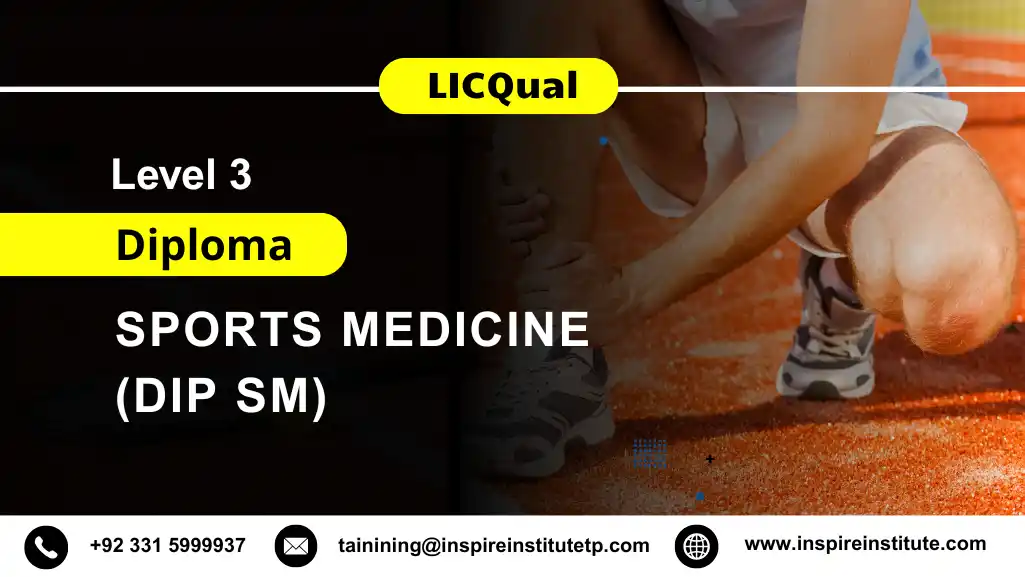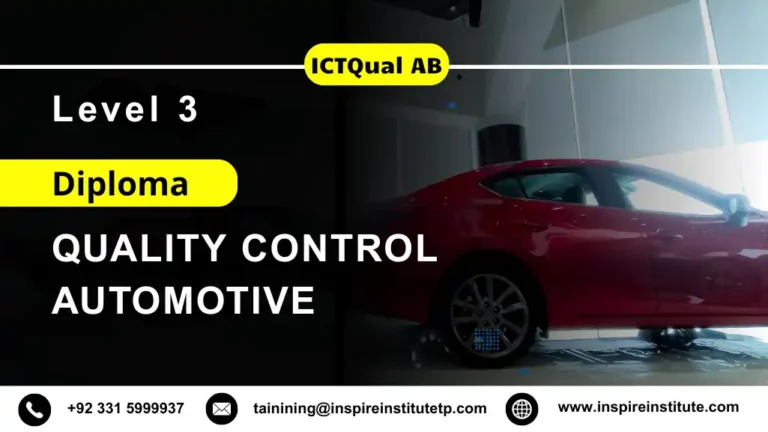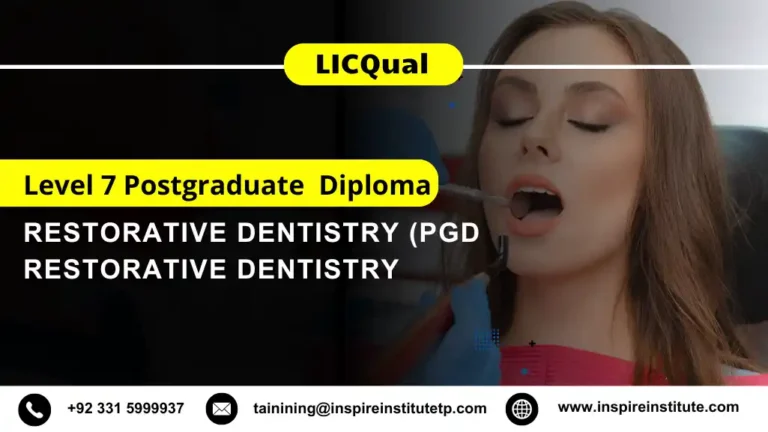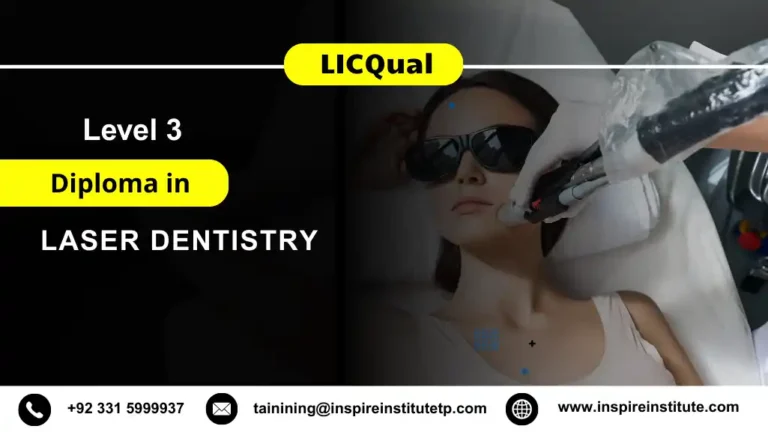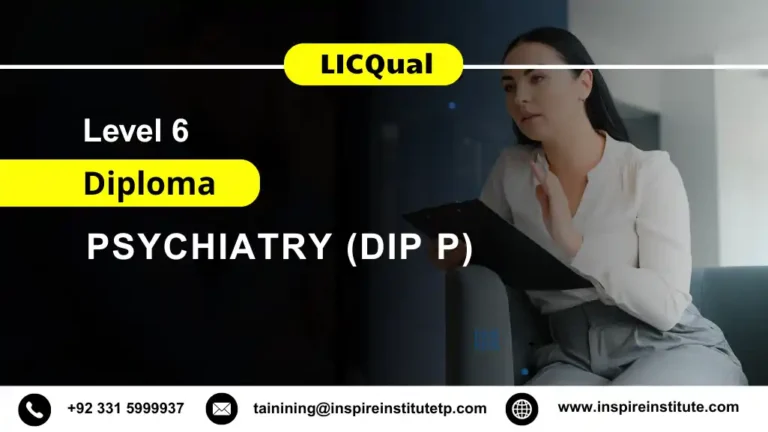LICQual Level 3 Diploma in Sports Medicine (Dip SM)
The LICQual Level 3 Diploma in Sports Medicine (Dip SM) is a UK-accredited qualification designed for healthcare professionals, physiotherapists, sports coaches, and fitness specialists seeking to develop advanced expertise in sports injury prevention, performance optimisation, and rehabilitation. In today’s competitive sports and fitness industry, understanding sports medicine is crucial for promoting athlete health, enhancing physical performance, and ensuring safe training practices. This assignment-based programme equips learners with a robust foundation in both theoretical knowledge and practical applications, making it ideal for individuals pursuing a career in sports medicine or allied health disciplines.
The course provides a comprehensive overview of sports physiology, biomechanics, musculoskeletal health, and injury management. Learners gain insight into the mechanisms of common sports injuries, including sprains, strains, fractures, and overuse conditions. sports injury management, athlete rehabilitation, and exercise physiology are embedded throughout the curriculum to strengthen learners’ professional knowledge and SEO relevance. By studying these principles, graduates are prepared to assess and manage injuries effectively in diverse athletic settings.
Practical application forms a core component of the programme, with learners developing skills in functional assessment, exercise prescription, rehabilitation planning, and performance monitoring. The course emphasises evidence-based approaches to sports medicine, enabling learners to integrate scientific research into clinical practice. Competence in injury prevention, emergency response, and tailored athlete support ensures graduates can confidently contribute to professional sports teams, clinics, and fitness centres.
The qualification is recognised internationally, validating learners’ expertise in sports medicine and enhancing career opportunities. Graduates gain credibility for roles in physiotherapy, sports coaching, athletic rehabilitation, and fitness consultancy. The UK-accredited diploma also provides a pathway for further professional development and specialisation in fields such as orthopaedics, exercise science, or advanced rehabilitation techniques.
Flexible, assignment-based learning allows professionals to balance career commitments with academic progression. Learners can study at their own pace, completing modules that integrate both theoretical content and applied skills, while engaging with real-world case studies. This structure ensures practical competency alongside academic knowledge, fostering confidence in clinical decision-making and athlete care.
By completing the LICQual Level 3 Diploma in Sports Medicine (Dip SM), learners acquire the essential skills to prevent, diagnose, and manage sports injuries while optimising athletic performance. The programme equips healthcare and fitness professionals with the expertise, critical thinking, and practical proficiency necessary to excel in the evolving field of sports medicine, making a meaningful impact on athlete health and wellness globally.
Why Choose this Qualification
The LICQual Level 3 Diploma in Sports Medicine (Dip SM) provides learners with the advanced knowledge, practical skills, and evidence-based understanding necessary to prevent injuries, optimise performance, and support rehabilitation in athletes and active populations. This UK-accredited, assignment-based qualification is ideal for healthcare professionals, physiotherapists, sports coaches, and fitness specialists who want to excel in sports medicine and allied health practice.
Key Reasons to Choose this Qualification
Comprehensive Sports Medicine Knowledge
- Gain an in-depth understanding of musculoskeletal anatomy, sports physiology, and biomechanics.
- Learn about the mechanisms and causes of common sports injuries, including sprains, strains, fractures, and overuse injuries.
- Understand exercise physiology principles to optimise athletic performance and endurance.
- Explore nutritional, psychological, and lifestyle factors affecting athlete health.
- Develop evidence-based strategies for injury prevention and performance enhancement.
Practical Skill Development
- Master assessment techniques for evaluating athlete fitness and injury risk.
- Develop competency in rehabilitation planning and functional recovery protocols.
- Learn hands-on approaches to emergency injury management and first response.
- Gain skills in prescribing tailored exercise programmes for performance improvement.
- Apply clinical reasoning to real-world case studies and athletic scenarios.
UK-Recognised Qualification
- Earn an internationally recognised diploma validating professional competence in sports medicine.
- Enhance employability in hospitals, physiotherapy clinics, fitness centres, and sports teams.
- Gain credibility for professional advancement and further specialisation.
- Align your qualification with global sports medicine and healthcare standards.
- Establish a foundation for pursuing advanced studies in exercise science, orthopaedics, or rehabilitation.
Flexible Learning Pathway
- Study at your own pace through an assignment-based format, ideal for working professionals.
- Access online resources and modules that combine theory with practical application.
- Balance professional commitments with academic progression effectively.
- Complete coursework remotely, ensuring flexibility and convenience.
- Enhance time management and self-directed learning skills.
Evidence-Based Training
- Engage with the latest research, international guidelines, and best practices in sports medicine.
- Learn to critically evaluate treatment options and intervention strategies.
- Develop decision-making skills for safe and effective athlete care.
- Understand risk management in sports and exercise settings.
- Implement evidence-driven approaches in clinical and coaching environments.
Career Development Opportunities
- Open doors to roles in physiotherapy, sports coaching, rehabilitation, and fitness consultancy.
- Enhance professional growth and advancement within sports medicine and healthcare sectors.
- Gain transferable skills for multidisciplinary healthcare and athletic support teams.
- Access opportunities in hospitals, clinics, gyms, sports academies, and rehabilitation centres.
- Establish a pathway for further education in advanced sports medicine or allied health disciplines.
Enhanced Athlete and Patient Care
- Develop skills to prevent injuries and improve long-term health outcomes.
- Deliver tailored rehabilitation programmes for different age groups and performance levels.
- Support athletes in maintaining optimal physical and mental well-being.
- Promote safe training environments and injury management protocols.
- Apply a holistic, patient-centred approach to sports medicine practice.
Professional Growth and Confidence
- Strengthen communication, teamwork, and leadership skills for healthcare and athletic settings.
- Cultivate ethical awareness, empathy, and professionalism in practice.
- Gain confidence in assessing, planning, and implementing interventions.
- Build resilience and problem-solving abilities in high-pressure environments.
- Prepare to become a skilled, competent, and responsible sports medicine practitioner.
Completing the LICQual Level 3 Diploma in Sports Medicine (Dip SM) equips learners with the knowledge, practical skills, and professional competence to excel in sports medicine, injury prevention, and athlete performance optimisation. This qualification ensures graduates are well-prepared to meet the demands of modern healthcare and athletic environments, advancing their careers and making a meaningful impact on athlete and patient outcomes.
Course Overview
LICQual UK Awarding Body
Average Completion Time:
4-12 Months
Study Units: 6 Units
Evidence & Assignment Based
Mandatory Units
Who Should Take This Course
The LICQual Level 3 Diploma in Sports Medicine (Dip SM) is designed for individuals seeking to develop specialised expertise in sports healthcare, rehabilitation, and performance optimisation. This assignment-based programme combines theoretical knowledge with practical application, making it ideal for learners aiming to advance their careers in healthcare, fitness, and sports performance.
This course is suitable for
Healthcare Professionals
- Physiotherapists looking to enhance knowledge of sports injuries and rehabilitation techniques.
- Nurses and medical assistants seeking specialised skills in athletic injury management.
- Doctors aiming to expand their expertise in musculoskeletal and sports-related conditions.
- Healthcare practitioners intending to integrate sports medicine into clinical practice.
- Professionals seeking UK-accredited recognition in sports medicine for career advancement.
Fitness and Exercise Specialists
- Personal trainers and fitness coaches aiming to improve client performance safely.
- Strength and conditioning coaches seeking evidence-based training strategies.
- Group exercise instructors wanting to incorporate injury prevention methods.
- Gym and wellness professionals looking to enhance client rehabilitation guidance.
- Sports performance specialists interested in physiological and biomechanical optimisation.
Athletic Coaches and Trainers
- Professional and amateur sports coaches aiming to prevent injuries in athletes.
- Team trainers seeking skills in performance monitoring and recovery programmes.
- School and collegiate athletic staff looking to implement safe training routines.
- Coaches working with diverse age groups requiring tailored conditioning plans.
- Sports instructors wanting to enhance technical knowledge in sports medicine.
Rehabilitation and Recovery Specialists
- Physiotherapy assistants focusing on athlete rehabilitation.
- Sports massage therapists seeking to integrate medical knowledge into practice.
- Occupational therapists working with sports-related functional recovery.
- Rehabilitation coordinators aiming to apply advanced sports therapy techniques.
- Practitioners wanting to improve patient outcomes through evidence-based care.
Aspiring Healthcare Students
- Medical or nursing students interested in specialising in sports medicine.
- Allied health students seeking practical knowledge in injury prevention and rehabilitation.
- Graduates pursuing careers in physiotherapy, orthopaedics, or sports medicine.
- Learners aiming to gain UK-recognised accreditation in a niche healthcare field.
- Students seeking flexible, assignment-based learning compatible with academic schedules.
Community Health and Wellness Practitioners
- Professionals working in community fitness and recreational programmes.
- Public health educators promoting physical activity and injury prevention.
- Health coaches aiming to integrate sports medicine principles into wellness plans.
- Rehabilitation and wellness coordinators developing local sports programmes.
- Individuals guiding community-based exercise interventions and injury prevention strategies.
Career Changers and Professionals Seeking Upskilling
- Individuals transitioning from general healthcare to sports medicine practice.
- Fitness or coaching professionals aiming to obtain formal accreditation.
- Healthcare workers seeking enhanced employability in athletic settings.
- Learners wanting to specialise in performance optimisation and rehabilitation.
- Professionals aiming to broaden their clinical and practical expertise in sports medicine.
Completing the LICQual Level 3 Diploma in Sports Medicine (Dip SM) equips learners with the practical skills, advanced knowledge, and professional competence needed to excel in sports healthcare, rehabilitation, and athletic performance. Graduates are prepared to contribute meaningfully to athlete care, injury prevention, and wellness promotion across clinical, fitness, and community settings, advancing their careers and professional impact.e their professional credibility, and contribute to improved patient outcomes in endocrinology and metabolic medicine.
Course Benefits
The LICQual Level 3 Diploma in Sports Medicine (Dip SM) offers extensive benefits for learners aiming to build expertise in sports health, injury prevention, and athletic performance management. By integrating theoretical foundations with evidence-based practical applications, this UK-accredited qualification equips learners to assess, manage, and support athletes and active individuals effectively. Designed as an assignment-based programme, it provides flexibility, academic excellence, and clinical relevance, supporting professional development for healthcare practitioners, physiotherapists, coaches, and aspiring specialists in sports medicine.
Key Benefits of the Course:
- Specialist Knowledge:
Gain an in-depth understanding of musculoskeletal anatomy, physiology, biomechanics, and common sports-related injuries. Learners explore exercise physiology, rehabilitation protocols, and the impact of nutrition, training load, and environmental factors on athletic performance. This knowledge enables graduates to make informed, evidence-based decisions to optimise athlete care and performance. - Practical Application:
Develop essential skills in athlete assessment, injury evaluation, treatment planning, and rehabilitation strategies. Learners gain practical competence in applying physiotherapy techniques, fitness assessment, and recovery programmes. The course ensures graduates can effectively implement theory in sports clinics, gyms, rehabilitation centres, and community health programmes. - Recognised Qualification:
Earn a UK-recognised diploma that validates advanced knowledge and practical skills in sports medicine. This internationally recognised qualification enhances professional credibility and career prospects, aligning with global healthcare and athletic performance standards. Graduates can pursue roles in hospitals, sports clinics, fitness centres, and athletic organisations. - Flexible Learning Pathway:
Delivered through an assignment-based format, the programme allows learners to balance professional or personal responsibilities while advancing academically. This flexibility is ideal for physiotherapists, coaches, healthcare assistants, and career changers seeking structured yet accessible training in sports health, injury prevention, and athlete management. - Evidence-Based Training:
The course integrates current research, clinical guidelines, and best practices in sports medicine. Learners engage with evidence-based approaches to injury prevention, rehabilitation, strength training, and performance optimisation. This ensures graduates adopt safe, effective, and ethical care practices while enhancing athlete outcomes. - Career Development:
This qualification opens diverse career opportunities in hospitals, clinics, sports rehabilitation centres, gyms, and athletic programmes. Graduates can pursue roles such as sports therapist, injury prevention specialist, rehabilitation coordinator, or progress to advanced studies in physiotherapy, exercise science, or sports health research. - Enhanced Athlete Care Delivery:
Learners develop the expertise to provide athlete-centred care through accurate assessment, personalised training plans, and rehabilitation programmes. Graduates are equipped to manage injuries, optimise recovery, and improve performance, contributing meaningfully to athlete wellbeing and competitive success. - Professional Growth:
The programme strengthens clinical reasoning, communication, and teamwork skills essential for effective sports healthcare delivery. Learners cultivate professionalism, empathy, and ethical awareness, preparing them to become confident, competent, and compassionate sports medicine practitioners.
The LICQual Level 3 Diploma in Sports Medicine (Dip SM) empowers learners with the knowledge, practical skills, and UK-recognised qualification needed to excel in sports healthcare. By combining rigorous academic learning with real-world application, it prepares healthcare professionals and aspiring practitioners to improve athlete outcomes, advance their careers, and make a meaningful impact in the field of sports medicine globally.
Eligibility Criteria
The LICQual Level 3 Diploma in Sports Medicine (Dip SM) is a UK-accredited qualification specifically designed for healthcare professionals, physiotherapists, sports coaches, and individuals seeking to specialise in sports health, injury prevention, and athletic performance management. This assignment-based programme provides a comprehensive understanding of musculoskeletal anatomy, exercise physiology, sports injury assessment, and rehabilitation strategies. By combining theoretical knowledge with practical application, the course equips learners with the skills to deliver high-quality, evidence-based sports medicine care. Learners who meet the entry requirements will be well-prepared to apply their expertise effectively in sports clinics, physiotherapy centres, gyms, athletic training facilities, and community health programmes.
Educational Background:
Applicants should hold a recognised qualification in healthcare, physiotherapy, sports science, or a related discipline. Candidates with Level 2 or Level 3 qualifications in healthcare, exercise science, anatomy, or clinical practice are encouraged to apply. Individuals with equivalent international qualifications will also be considered, provided their credentials meet the academic and professional standards of the programme. The diploma is particularly suitable for learners with an educational background in sports health, physiotherapy, or allied healthcare who wish to enhance their competence in sports medicine and athletic performance care.
Professional Experience:
Previous professional experience in sports healthcare, physiotherapy, or clinical practice is beneficial but not mandatory. A minimum of one year’s experience in healthcare, athletic training, or rehabilitation is recommended. Applicants who have worked in sports clinics, gyms, physiotherapy units, or community health programmes will find this qualification particularly valuable. Individuals without prior experience but with a strong interest in sports medicine are also encouraged to apply, as the course provides comprehensive foundational and practical training to develop competence in this specialised field.
Age Requirement:
Learners must be at least 18 years old at the time of enrolment. This requirement ensures that learners possess the maturity, discipline, and professional responsibility necessary for studying sports medicine, which involves complex medical and physiological topics, ethical considerations, and athlete-centred care. The programme demands commitment, analytical thinking, and practical reasoning aligned with professional standards for adult healthcare education.
Language Proficiency:
As the LICQual Level 3 Diploma in Sports Medicine (Dip SM) is delivered and assessed in English, learners must demonstrate strong proficiency in reading, writing, and communication. Non-native English speakers are expected to hold an IELTS score of at least 6.0 or an equivalent qualification. This ensures learners can engage effectively with technical course materials, complete assignments, and communicate professionally with athletes, healthcare colleagues, and academic mentors. Strong English proficiency also supports accurate documentation and safe, effective patient and athlete care.
Technical Requirements:
Applicants should have access to a personal computer or laptop with a reliable internet connection to participate fully in the online learning process. Basic IT literacy is essential, including familiarity with word processing software, digital research tools, and online learning platforms. Since this qualification is assignment-based, learners submit coursework electronically and engage in self-directed study using digital resources. The flexible online structure enables learners to manage their education alongside professional and personal responsibilities.
Required Documents:
To complete the registration process, applicants must provide a valid passport or national identification card for identity verification, along with proof of educational qualifications such as certificates or academic transcripts. Evidence of relevant professional or sports healthcare experience should also be submitted where applicable. International candidates may be required to provide certified translations of academic or professional documents to verify authenticity and eligibility. These requirements ensure all learners meet the academic, linguistic, and professional standards necessary for successful enrolment in the programme.
The Qualification Process
LICQual Level 3 Diploma in Sports Medicine (Dip SM) follows a structured pathway to ensure learners gain comprehensive knowledge, practical skills, and professional competence in community oral healthcare.
Step 1: Self-Assessment
Learners review the entry requirements to confirm eligibility. Candidates with a background in dentistry, oral health, or public health are encouraged to apply.
Step 2: Registration
Complete the registration process by submitting required documents such as proof of qualifications, a valid ID, and payment of enrollment fees.
Step 3: Induction
An induction session is conducted to:
- Verify learner eligibility and documentation.
- Introduce study materials, learning outcomes, and assessment procedures.
Step 4: Learning and Evidence Submission
Learners complete assignments, case studies, and practical exercises demonstrating competence in public health dentistry, community oral health assessment, preventive strategies, and program planning.
Step 5: Feedback and Revision
Assessors review submitted evidence and provide constructive feedback. Learners can revise and resubmit work to meet all required standards.
Step 6: Competence Validation
Final submissions are evaluated to confirm that learners have met all theoretical and practical learning outcomes.
Step 7: Internal Quality Assurance (IQA)
The IQA team reviews the assessment process to ensure accuracy, fairness, and compliance with international standards.
Step 8: External Verification (EQA)
External verifiers validate the authenticity and quality of learner achievements.
Step 9: Certification
Upon successful verification, learners are awarded LICQual Level 3 Diploma in Sports Medicine (Dip SM) , demonstrating advanced proficiency in community oral healthcare and preparing them for professional growth in dental public health, preventive dentistry, and healthcare policy.

